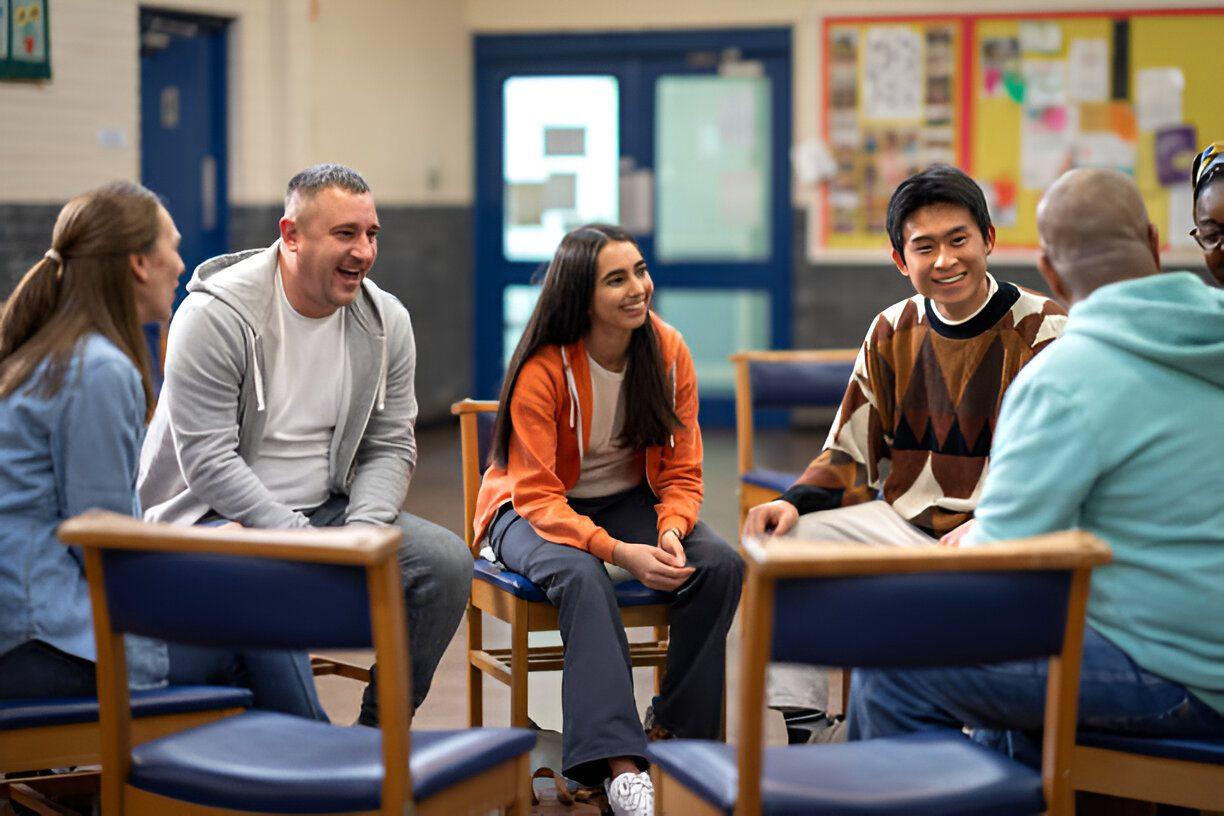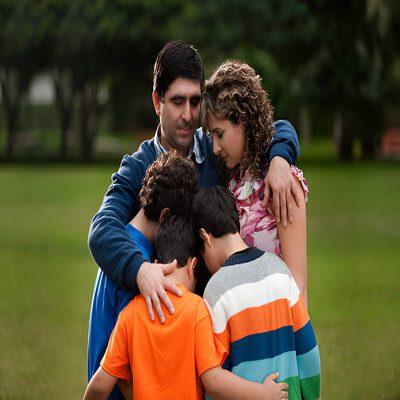Standing Together in Shared Sorrow
Loss doesn’t only affect the one who experiences it firsthand—it can also weigh on the hearts of those who care about them. When a friend grieves, we often find ourselves mourning alongside them, wishing we could shoulder their burden. This post explores how to walk beside someone through their darkest hours while preserving your own emotional well-being.
“When my best friend lost her father, I felt the ache of his absence too. Supporting her ended up healing parts of me I didn’t realize were broken.”
Walking Beside Their Pain

When a Friend’s Loss Becomes Your Grief
When someone close to us suffers a profound loss, the ripple effect can extend into our own lives. Their grief becomes ours, not just because we feel for them, but because we share their pain in a uniquely personal way. This is often referred to as secondary grief—a heartfelt reaction to someone else’s suffering. It’s a testament to the deep bond between friends but also presents its own emotional complexities. Here’s how to navigate this shared journey of loss.
Understanding Secondary Grief
Empathy and Shared Pain:
When a friend endures loss, our empathy for them can create a connection so deep that their pain feels like our own. It’s more than sympathy; it’s a visceral reaction to the void in their life and, by extension, in yours.
The Layered Impact:
The nature of the loss influences your grief. It could be the death of a loved one, the end of a marriage, or a life-altering change in their circumstances. In each case, you may grieve for their suffering, the relationship you had with what was lost, or even the changes this loss brings to your dynamic.
Emotional Overlap:
Your emotions may range from sadness and helplessness to frustration or guilt. You might question if you’re doing enough for your friend or feel conflicted about experiencing grief over something that wasn’t “yours” to lose. These feelings are normal and part of the shared journey.
Navigating Your Shared Grief
Acknowledging Dual Grief:
Recognize that your grief is valid, even though it stems from your friend’s experience. It’s okay to mourn the loss, whether you’re grieving alongside them or experiencing it in your own unique way.
Support, Not Substitution:
Your role isn’t to carry their grief for them but to walk beside them. Be their anchor when they need it while maintaining your own emotional health. Supporting without absorbing all their pain ensures you can stay present for them without depleting yourself.
Practicing Self-Care:
Supporting a grieving friend can be emotionally and physically draining. Prioritize your own self-care by ensuring you have time to process your feelings, rest, and recharge. You can’t pour from an empty cup.
Practical Ways to Help
- Be Present: Sometimes, your presence is the most valuable gift. Whether it’s sitting quietly with them, running errands, or simply checking in with a text, these gestures remind them they’re not alone.
- Offer Specific Help: Grief can overwhelm even the simplest tasks. Offering specific assistance, such as cooking meals, driving them to appointments, or helping with household chores, can ease their burden without requiring them to ask for help.
- Share the Memories: If the loss is of a mutual loved one, sharing stories or memories can provide comfort. This reinforces their connection to what they’ve lost while allowing both of you to grieve together in a meaningful way.
Strengthening Social Bonds
- Engage Mutual Friends: If the loss affects a shared group, involve mutual friends in offering support. This not only lightens the load but creates a collective environment of understanding and care.
- Communicate Clearly: Talk openly with your friend about how you can help. Whether it’s giving them space or spending more time together, clear communication ensures your actions align with their needs.
- Foster Connection: Encourage your friend to connect with others, whether through a support group, family, or community activities. This can provide them with multiple sources of comfort and lessen their isolation.
“Sometimes, the most comforting words are the silent ones—simply being there can speak volumes.”
— Lucas D.
Psychological and Emotional Support
- Set Boundaries:
While empathy is powerful, it’s essential to set boundaries to protect your own mental health. Supporting your friend doesn’t mean you have to sacrifice your emotional stability. - Seek Professional Guidance:
If their loss has significantly impacted you, consider seeking therapy to navigate your feelings. This ensures that your own grief is validated and processed without taking away from their experience. - Understand Their Process:
Every person grieves differently. Your friend may oscillate between moments of numbness, anger, or even humor as they cope. Respect their journey and avoid imposing expectations about how or when they “should” feel better.
Long-Term Healing
Accepting Change:
Grief alters relationships, including friendships. Embrace the changes it brings, whether it’s a deeper bond forged through shared sorrow or a gradual shift in the friendship’s dynamics.
Celebrate Life Together:
Find ways to honor what was lost in a way that feels authentic to your friendship. This could involve continuing traditions, marking anniversaries, or pursuing causes that reflect the spirit of the loved one.
Growth Through Empathy:
Shared grief has the potential to deepen your understanding of human connection. Use this experience to cultivate resilience, compassion, and appreciation for the friendships in your life.
Things To Try This Week!
- Schedule a Low-Key Check-In: Pick a day to visit or call your friend, without expecting anything in return. Simply be there as a supportive presence.
- Reflect on Your Emotions: Journal about your own secondary grief. Acknowledge the ways their loss affects you personally—validating your own sorrow fosters healthier support.
- Plan a Small Act of Kindness: Surprise your friend with a thoughtful gesture—like a home-cooked meal, a heartfelt note, or an offer to help with an errand.
Conclusion
When a friend’s loss becomes your grief, it’s a profound reminder of the interconnectedness of relationships. It’s an opportunity to show up with love, patience, and understanding, not just for their healing but for your shared journey through pain. By navigating this grief with care, you can strengthen your bond, honor the loss, and create a foundation for mutual growth and resilience. Through this shared sorrow, friendships can become a source of light, reminding us that we are never truly alone in our darkest moments.
Even as you stand by your friend in their darkest hours, remember to nurture your own heart, too.
Explore our cherish section for comforting tokens, meaningful insights, and reflective activities designed to keep compassion thriving—both for your friend and for yourself.
Friends & Community: Holding Onto the Bonds That Shape Us
Friendships connect us in life-changing ways, and losing those connections can leave us seeking new footing. Here, explore resources and reflections that validate your grief, offer comfort, and honor the unique imprint of a cherished friend.
More Reflections, More Growth
Loss is complex, and the road to healing is different for everyone. These reflections offer insight, support, and guidance as you navigate this journey.
When Shared Laughter Fades: Grieving the Loss of a Best Friend
Losing a best friend is one of life’s most profound sorrows. Whether due to death, distance, or the end of the friendship, the grief touches every part of your life. This guide offers support, practical steps, and hope to help you honor the bond and find healing.
Carrying the Torch: Honoring the Loss of a Community Leader
The passing of a community leader leaves a void in the heart of the community. Learn how to honor their memory, celebrate their contributions, and ensure their legacy inspires future generations.
Carrying Their Light: Honoring the Loss of a Beloved Teacher or Mentor
The loss of a beloved teacher or mentor ripples through individuals and communities alike. Learn how to navigate this grief, honor their legacy, and ensure their influence continues to inspire future generations.
How Friendships Can Help Heal After Loss: Support and Recovery
Friendships offer emotional support, shared memories, and companionship that are invaluable during grief. Learn how the power of connection can guide you through healing after loss.
Supporting Grieving Students in the Classroom: A Teacher’s Guide
Grief in young students often appears as confusion, withdrawal, or even unexpected bursts of emotion. Teachers, as pillars of stability, can make a profound difference. This guide offers practical strategies, heartfelt insights, and tools to create a compassionate classroom where grieving children feel supported and understood.”
Explore Journeys of Healing and Solace:
Discover dedicated spaces that offer understanding, guidance, and connection through grief. From the loss of loved ones to life’s challenging transitions, each category provides a pathway to reflect, connect, and find peace in shared experiences.






















